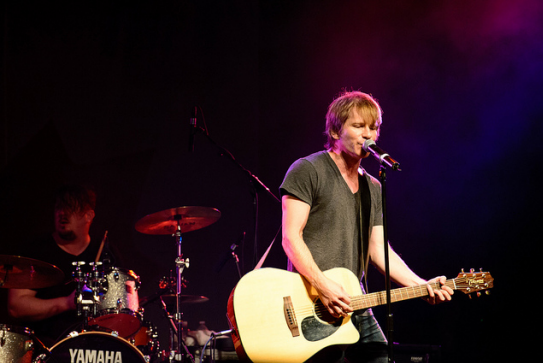By Dessa Bayrock (The Cascade) – Email
Print Edition: July 17, 2013
Tom Barlow hit the Canadian scene nearly a decade ago with his self-titled album, and released a long-awaited second album earlier this year. His work between the two albums has included allying with researchers to study the effect music has on learning and brain chemistry through school visits and study tours. Our conversation ranged from neuroscience to politics, and took place in a relatively quiet corner of a busy coffee shop in Regina during Juno week. Although Barlow was nominated for a Juno, it ultimately went to another artist.
Tell me more about your interest with neuroscience, and how you got involved with that project.
I read a book called This is Your Brain on Music, David Levinson’s book. When you hang around musicians you obviously love music, so you talk about music a lot. We talk about music all the time. And I realized that in spite of the fact that I knew a lot about music, I didn’t know the basic things: where did it come from? Why do we make it? What does it do to our brains? What kind of chemicals are released when we listen to it?
So this guy, David Levinson, was coming to Waterloo and was doing an experiment with 100 people, so I got into the experiment and just fell in love with the concept. And at the same time, I thought, kids love music. Kids love music more than you and I love it. When you’re 12, 13, 14, it’s so overwhelmingly powerful. There’s a connection at that level, when your brain is growing and you’re growing as a person, and who you are starts to be identified with Taylor Swift or Justin Bieber, or the Beatles – that goes to a very special place in your brain. That’s why when people have Alzheimer’s or dementia, their brains remember that. They remember those songs more than their child’s names, more than where they were born.
So all of this magical stuff that music did – I just became fascinated by that. And I thought, why not tell kids about that? It’s not stupid that they love Justin Bieber. I’m talking about their passion for it – it’s important. It’s powerful. It alters their brains, and their brain development. And if we can use that power to help kids learn better, we’re idiots not to. Our society still hasn’t accepted that.
It’s a tangled thing, right – because it’s a passion of mine, but it’s not my job. The thing I love doing most is writing songs and playing songs. It’s like those hockey players who are obsessed with golf – I’m a musician, and I have this thing I love talking about and I love taking to kids. They get it. You don’t have to explain it to them. It’s adults who don’t get it. In some ways I think we’re telling the kids so they tell the adults.
Moving away from neuroscience and back into music – your first album came out in 2004? 2003? Then you kind of dropped off the map for a decade, but now you’re back. Where did you go? What did you do? What have you seen?
Well, I was with a major label, and the major label got swallowed up by a different major label, and that’s always a pain in the ass. We’re talking about lawyers and managers and corporations – so I thought, I’m just going to let that go and do other things.
So I had a really cool indie band, called the Beautiful Unknown. We did a lot of touring, and made a lot of cool records.
And I travelled a lot; I started doing tours in the Arctic—you know, those eco-tours—to the most remote Canadian communities. Baffin Island, northern Labrador, Greenland. I did Central America, and the Galapagos, and just everywhere I wanted to go. Tried to become a better writer, and tried to have different experiences.
Then I sent some songs to my old management, and they were like, “We should do a record.” And we did, and I really like it. I get to reconnect with people who were fans of that old band – that band had some really cool songs that did really well, and I think this album is on that page. Like, chapter two.
I think the reason that first album got so much attention was because you were dealing with things like homelessness and body image and same sex marriage – just kind of bringing them out in the open and saying, “Here they are. I’m going to talk about them, and in a normal way.”
You don’t get to pick what you’re going to write songs about – they pick you. I remember a lot of people in the industry and not in the industry thought it was a little preachy. And I thought, I don’t care. It’s preachy to you – it’s not preachy to the person that needs to hear that, and that’s the person I’d rather talk to.
You know – we have a song about the financial crisis on the new album. Financial crises and rock and roll are not really two things that would generally be put together. Why not? Virtually all of our politicians are lawyers or businessmen. There’s a need for different voices, and musicians can be a different voice. Neil Young was a different voice. Bob Dylan was a different voice, and Bob Marley was a different voice. So if something bothers me, and it’s a more political or social thing, I’m going to write something about it. It’s my job. That’s the way it goes.
This interview has been edited for length and clarity.



